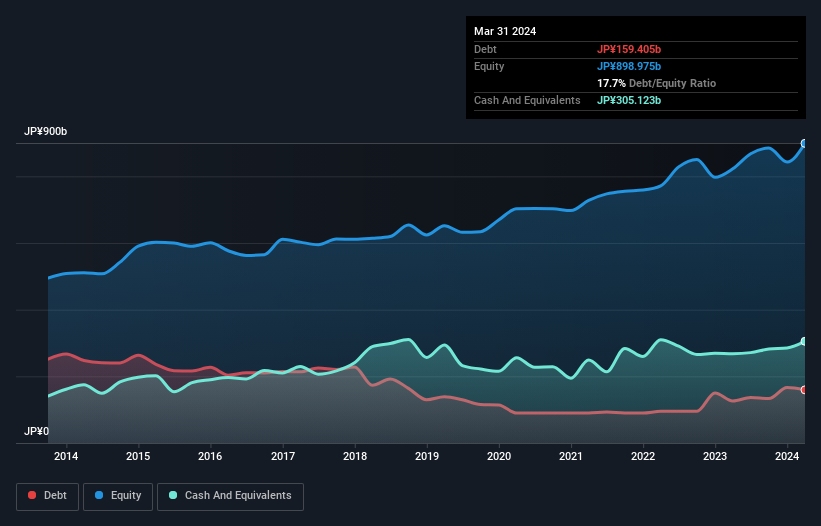
Legendary fund manager Li Lu (who Charlie Munger backed) once said, 'The biggest investment risk is not the volatility of prices, but whether you will suffer a permanent loss of capital.' When we think about how risky a company is, we always like to look at its use of debt, since debt overload can lead to ruin. We note that Eisai Co., Ltd. (TSE:4523) does have debt on its balance sheet. But the real question is whether this debt is making the company risky.
Why Does Debt Bring Risk?
Debt assists a business until the business has trouble paying it off, either with new capital or with free cash flow. In the worst case scenario, a company can go bankrupt if it cannot pay its creditors. While that is not too common, we often do see indebted companies permanently diluting shareholders because lenders force them to raise capital at a distressed price. By replacing dilution, though, debt can be an extremely good tool for businesses that need capital to invest in growth at high rates of return. The first thing to do when considering how much debt a business uses is to look at its cash and debt together.
See our latest analysis for Eisai
How Much Debt Does Eisai Carry?
As you can see below, at the end of March 2024, Eisai had JP¥159.4b of debt, up from JP¥126.1b a year ago. Click the image for more detail. However, its balance sheet shows it holds JP¥305.1b in cash, so it actually has JP¥145.7b net cash.

How Healthy Is Eisai's Balance Sheet?
Zooming in on the latest balance sheet data, we can see that Eisai had liabilities of JP¥304.5b due within 12 months and liabilities of JP¥190.4b due beyond that. On the other hand, it had cash of JP¥305.1b and JP¥217.2b worth of receivables due within a year. So it actually has JP¥27.5b more liquid assets than total liabilities.
This state of affairs indicates that Eisai's balance sheet looks quite solid, as its total liabilities are just about equal to its liquid assets. So while it's hard to imagine that the JP¥1.98t company is struggling for cash, we still think it's worth monitoring its balance sheet. Simply put, the fact that Eisai has more cash than debt is arguably a good indication that it can manage its debt safely.
And we also note warmly that Eisai grew its EBIT by 15% last year, making its debt load easier to handle. There's no doubt that we learn most about debt from the balance sheet. But ultimately the future profitability of the business will decide if Eisai can strengthen its balance sheet over time. So if you want to see what the professionals think, you might find this free report on analyst profit forecasts to be interesting.
Finally, while the tax-man may adore accounting profits, lenders only accept cold hard cash. While Eisai has net cash on its balance sheet, it's still worth taking a look at its ability to convert earnings before interest and tax (EBIT) to free cash flow, to help us understand how quickly it is building (or eroding) that cash balance. Over the most recent three years, Eisai recorded free cash flow worth 58% of its EBIT, which is around normal, given free cash flow excludes interest and tax. This cold hard cash means it can reduce its debt when it wants to.
Summing Up
While it is always sensible to investigate a company's debt, in this case Eisai has JP¥145.7b in net cash and a decent-looking balance sheet. And it also grew its EBIT by 15% over the last year. So is Eisai's debt a risk? It doesn't seem so to us. There's no doubt that we learn most about debt from the balance sheet. However, not all investment risk resides within the balance sheet - far from it. For example, we've discovered 1 warning sign for Eisai that you should be aware of before investing here.
If, after all that, you're more interested in a fast growing company with a rock-solid balance sheet, then check out our list of net cash growth stocks without delay.
Valuation is complex, but we're here to simplify it.
Discover if Eisai might be undervalued or overvalued with our detailed analysis, featuring fair value estimates, potential risks, dividends, insider trades, and its financial condition.
Access Free AnalysisHave feedback on this article? Concerned about the content? Get in touch with us directly. Alternatively, email editorial-team (at) simplywallst.com.
This article by Simply Wall St is general in nature. We provide commentary based on historical data and analyst forecasts only using an unbiased methodology and our articles are not intended to be financial advice. It does not constitute a recommendation to buy or sell any stock, and does not take account of your objectives, or your financial situation. We aim to bring you long-term focused analysis driven by fundamental data. Note that our analysis may not factor in the latest price-sensitive company announcements or qualitative material. Simply Wall St has no position in any stocks mentioned.
Have feedback on this article? Concerned about the content? Get in touch with us directly. Alternatively, email editorial-team@simplywallst.com
About TSE:4523
Eisai
Engages in the research and development, manufacture, sale, and import and export of pharmaceuticals in Japan.
Proven track record with adequate balance sheet and pays a dividend.
Similar Companies
Market Insights
Community Narratives


